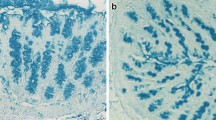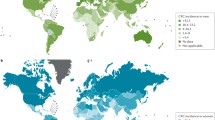Abstract
Resistant starch decreases the concentration of secondary bile acids in the feces and the proliferation rate of colonic mucosal cells in healthy volunteers. This may reduce the risk of colon cancer. We investigated 23 patients with recently removed colonic adenoma(s) in a controlled parallel trial. They consumed 45 g of maltodextrin per day as placebo for four weeks and were randomly assigned to either 45 g of native amylomaize starch, containing 28 g of resistant starch type II or 45 g of maltodextrin for another four weeks. No effect on colorectal cell proliferation, fecal wet and dry weights, pH, and short-chain fatty acid excretion was seen. The bile acid concentration in fecal water decreased by 15% (P = 0.048) and the percentage secondary bile acids decreased by 14% (P = 0.002) on resistant starch relative to placebo. Whether this has a substantial role in colon cancer prevention in these patients remains to be established.
Similar content being viewed by others
REFERENCES
Potter JD: Nutrition and colorectal cancer. Cancer Causes Control 7:127–146, 1996
Steinmetz KA, Potter JD: Vegetables, fruit, and cancer prevention: A review. J Am Diet Assoc 96:1027–1039, 1996
Hill MJ: Cereals, cereal fibre and colorectal cancer risk: A review of the epidemiological literature. Eur J Cancer Prev 6:219–225, 1997
Asp NG: Dietary fibre-definition, chemistry and analytical determination. Mol Aspects Med 9:17–29, 1987
Kim YI: AGA technical review: Impact of dietary fiber on colon cancer occurrence. Gastroenterology 118:1235–1257, 2000
Fleming SE, Marthinsen D, Kuhnlein H: Colonic function and fermentation in men consuming high fiber diets. J Nutr 113:2535–2544, 1983
Pomare EW, Branch WJ, Cummings JH: Carbohydrate fermentation in the human colon and its relation to acetate concentrations in venous blood. J Clin Invest 75:1448–1454, 1985
Flourie B, Florent C, Jouany JP, Thivend P, Etanchaud F, Rambaud JC: Colonic metabolism of wheat starch in healthy humans. Effects on fecal outputs and clinical symptoms. Gastroenterology 90:111–119, 1986
Reddy B, Engle A, Katsifis S, Simi B, Bartram HP, Perrino P, Mahan C: Biochemical epidemiology of colon cancer: Effect of types of dietary fiber on fecal mutagens, acid, and neutral sterols in healthy subjects. Cancer Res 49:4629–4635, 1989
Cummings JH, Hill MJ, Jenkins DJ, Pearson JR, Wiggins HS: Changes in fecal composition and colonic function due to cereal fiber. Am J Clin Nutr 29:1468–1473, 1976
Cummings JH, Branch W, Jenkins DJ, Southgate DA, Houston H, James WP: Colonic response to dietary fibre from carrot, cabbage, apple, bran. Lancet 1:5–9, 1978
Fleming SE, O'Donnell AU, Perman JA: Influence of frequent and long-term bean consumption on colonic function and fermentation. Am J Clin Nutr 41:909–918, 1985
Haack VS, Chesters JG, Vollendorf NW, Story JA, Marlett JA: Increasing amounts of dietary fiber provided by foods normalizes physiologic response of the large bowel without altering calcium balance or fecal steroid excretion. Am J Clin Nutr 68:615–622, 1998
Chen HL, Haack VS, Janecky CW, Vollendorf NW, Marlett JA: Mechanisms by which wheat bran and oat bran increase stool weight in humans. Am J Clin Nutr 68:711–719, 1998
Englyst HN, Kingman SM, Cummings JH: Classification and measurement of nutritionally important starch fractions. Eur J Clin Nutr 46Suppl 2:S33–S50, 1992
Ranganathan S, Champ M, Pechard C, Blanchard P, Nguyen M, Colonna P, Krempf M: Comparative study of the acute effects of resistant starch and dietary fibers on metabolic indexes in men. Am J Clin Nutr 59:879–883, 1994
van Munster IP, de Boer HM, Jansen MC, de Haan AF, Katan MB, van Amelsvoort JM, Nagengast FM: Effect of resistant starch on breath-hydrogen and methane excretion in healthy volunteers. Am J Clin Nutr 59:626–630, 1994
Nordgaard I, Mortensen PB, Langkilde AM: Small intestinal malabsorption and colonic fermentation of resistant starch and resistant peptides to short-chain fatty acids. Nutrition 11:129–137, 1995
Muir JG, Lu ZX, Young GP, Cameron SD, Collier GR, O'Dea K: Resistant starch in the diet increases breath hydrogen and serum acetate in human subjects. Am J Clin Nutr 61:792–799, 1995
Hylla S, Gostner A, Dusel G, Anger H, Bartram HP, Christl SU, Kasper H, Scheppach W: Effects of resistant starch on the colon in healthy volunteers: possible implications for cancer prevention. Am J Clin Nutr 67:136–142, 1998
Van Munster IP, Tangerman A, Nagengast FM: Effect of resistant starch on colonic fermentation, bile acid metabolism, and mucosal proliferation. Dig Dis Sci 39:834–842, 1994
Phillips J, Muir JG, Birkett A, Lu ZX, Jones GP, O'Dea K, Young GP: Effect of resistant starch on fecal bulk and fermen-tation-dependent events in humans. Am J Clin Nutr 62:121–130, 1995
Cummings JH, Beatty ER, Kingman SM, Bingham SA, Englyst HN: Digestion and physiological properties of resistant starch in the human large bowel. Br J Nutr 75:733–747, 1996
Alberts DS, Martinez ME, Roe DJ, Guillen RJ, Marshall JR, van-Leeuwen JB, Reid ME, Ritenbaugh C, Vargas PA, Bhattacharyya AB, Earnest DL, Sampliner RE: Lack of effect of a high-fiber cereal supplement on the recurrence of colorectal adenomas. N Engl J Med 342:1156–1162, 2000
Thornton JR, Dryden A, Kelleher J, Losowsky MS: Superefficient starch absorption. A risk factor for colonic neoplasia? Dig Dis Sci 32:1088–1091, 1987
Clausen MR, Bonnen H, Mortensen PB: Colonic fermentation of dietary fibre to short chain fatty acids in patients with adenomatous polyps and colonic cancer. Gut 32:923–928, 1991
Velazquez OC, Lederer HM, Rombeau JL: Butyrate and the colonocyte. Implications for neoplasia. Dig Dis Sci 41:727–739, 1996
Vogelstein B, Kinzler KW: The multistep nature of cancer. Trends Genet 9:138–141, 1993
Lipkin M: Biomarkers of increased susceptibility to gastrointestinal cancer. Their development and application to studies of cancer prevention. Gastroenterology 92:1083–1086, 1987
Ponz dL, Roncucci L, Di Donato P, Tassi L, Smerieri O, Amorico MG, Malagoli G, De Maria D, Antonioli A, Chahin NJ: Pattern of epithelial cell proliferation in colorectal mucosa of normal subjects and of patients with adenomatous polyps or cancer of the large bowel. Cancer Res 48:4121–4126, 1988
Scalmati A, Roncucci L, Ghidini G, Biasco G, Ponz dL: Epithelial cell kinetics in the remaining colorectal mucosa after surgery for cancer of the large bowel. Cancer Res 50:7937–7941, 1990
Terpstra OT, van Blankenstein M, Dees J, Eilers GA: Abnormal pattern of cell proliferation in the entire colonic mucosa of patients with colon adenoma or cancer. Gastroenterology 92:704–708, 1987
Cats A, de Vries EG, Kleibeuker JH: Proliferation rate in hereditary nonpolyposis colon cancer. J Natl Cancer Inst 83:1687–1689, 1991
Einspahr JG, Alberts DS, Gapstur SM, Bostick RM, Emerson SS, Gerner EW: Surrogate end-point biomarkers as measures of colon cancer risk and their use in cancer chemoprevention trials. Cancer Epidemiol Biomarkers Prev 6:37–48, 1997
Wargovich MJ, Isbell G, Shabot M, Winn R, Lanza F, Hochman L, Larson E, Lynch P, Roubein L, Levin B: Calcium supplementation decreases rectal epithelial cell proliferation in subjects with sporadic adenoma. Gastroenterology 103:92–97, 1992
Stadler J, Stern HS, Yeung KS, McGuire V, Furrer R, Marcon N, Bruce WR: Effect of high fat consumption on cell proliferation activity of colorectal mucosa and on soluble faecal bile acids. Gut 29:1326–1331, 1988
van Gorkum BAP, Karrenbeld A, van der Meer R, de Vries EGE, Kleibeuker JH: Colonic epithelial cell proliferation throughout the colon is not affected by supplementary calcium or resistant starch in adenoma patients: results of a controlled study. Eur J Gastroenterol Hepatol 11:A24, 1999
Anonymous. NEVO tabe. Nederlands Voedingstoffenbestand (NEVO table. Dutch nutrient database). Den Haag, Netherlands, Voorlichtingsbureau voor de Voeding, 1987 (in Dutch)
van Faassen A, Nagengast FM, Hectors M, van den Broek WJ, Huijbregts AW, Van der Werf SD, van Berge Henegouwen GP, van Tongeren JH: Determination of individual human faecal bile acids by gas-liquid chromatography after enzymatic deconjugation and simultaneous solvolysis and methylation using dimethoxypropane. Clin Chim Acta 152:231–239, 1985
Tangerman A, van-Schaik A, Meuwese AM, van-Tongeren JH: Quantitative determination of C2-C8 volatile fatty acids in human serum by vacuum distillation and gas chromatography. Clin Chim Acta 133:341–348, 1983
Narisawa T, Magadia NE, Weisburger JH, Wynder EL: Promoting effects of bile acids on colon carcinogenesis after intrarectal instillation of MNNG in rats. J Natl Cancer Inst 53:1093–1097, 1974
Chomsai C, Bhadrachari N, Nigro ND: The effect of bile on the induction of experimental intestinal tumours in rats. Dis Colon Rectum 17:310–312, 1974
Koga S, Kaibara N, Takeda R: Effect of bile acids on 1,2-dimethylhydrazine-induced colon cancer in rats. Cancer 50:543–547, 1982
Valhouny GV, Satchithanandram S, Lightfood F: Morphological disruption of colonic mucosa by free or cholestyraminebound bile acids. Dig Dis Sci 29:439–442, 1984
Hill MJ: Bile acids and colorectal cancer: hypothesis. Eur J Cancer Prev 1(suppl 2):69–72, 1991
van Munster IP, Tangerman A, de Haan AF, Nagengast FM: A new method for the determination of the cytotoxicity of bile acids and aqueous phase of stool: The effect of calcium. Eur J Clin Invest 23:773–777, 1993
Lapre JA, van der Meer R: Diet-induced increase of colonic bile acids stimulates lytic activity of fecal water and proliferation of colonic cells. Carcinogenesis 13:41–44, 1992
Rafter JJ, Eng VW, Furrer R, Medline A, Bruce WR: Effects of calcium and pH on the mucosal damage produced by deoxycholic acid in the rat colon. Gut 27:1320–1329, 1986
Walker AR, Walker BF, Walker AJ: Faecal pH, dietary fibre intake, and proneness to colon cancer in four South African populations. Br J Cancer 53:489–495, 1986
Thornton JR: High colonic pH promotes colorectal cancer. Lancet 1:1081–1083, 1981
Cummings JH: Short chain fatty acids in the human colon. Gut 22:763–779, 1981
Butler LM, Hewett PJ, Fitridge RA, Cowled PA: Deregulation of apoptosis in colorectal carcinoma: Theoretical and therapeutic implications. Aust N Z J Surg 69:88–94, 1999
Heerdt BG, Houston MA, Anthony GM, Augenlicht LH: Mitochondrial membrane potential (delta psi(mt)) in the coordination of p53-independent proliferation and apoptosis pathways in human colonic carcinoma cells. Cancer Res 58:2869–2875, 1998
Payne CM, Bernstein H, Bernstein C, Garewal H: Role of apoptosis in biology and pathology: Resistance to apoptosis in colon carcinogenesis. Ultrastruct Pathol 19:221–248, 1995
Dysseler P, Hoffem D: Estimation of resistant starch intake in Europe. In Proceedings of the Concluding Plenary Meeting of EURESTA. NG, Asp JM, van Amelsvoort JG Hautvast (eds). Den Haag, CIP-data Koninklijke Bibliotheek, 1995, pp 87–94
Kashtan H, Stern HS, Jenkins DJ, Jenkins AL, Thompson LU, Hay K, Marcon N, Minkin S, Bruce WR: Colonic fermentation and markers of colorectal-cancer risk. Am J Clin Nutr 55:723–728, 1992
Rights and permissions
About this article
Cite this article
Grubben, M., Braak, C.v.d., Essenberg, M. et al. Effect of Resistant Starch on Potential Biomarkers for Colonic Cancer Risk in Patients with Colonic Adenomas. Dig Dis Sci 46, 750–756 (2001). https://doi.org/10.1023/A:1010787931002
Issue Date:
DOI: https://doi.org/10.1023/A:1010787931002




